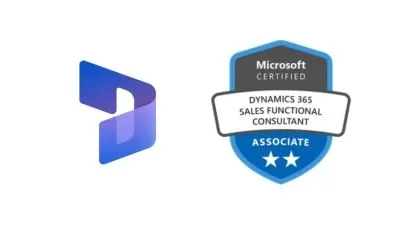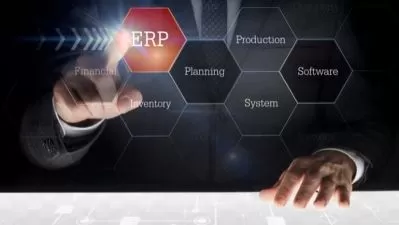Implementing CRM and ERP systems
Khawar Nehal
1:18:25
Description
Avoiding problems in implementation
What You'll Learn?
- Understand CRM and ERP Concepts: Define and differentiate between CRM and ERP systems. Explain the key components and modules of both CRM and ERP systems.
- Analyze Business Needs: Identify the business processes that can benefit from CRM and ERP implementation. Evaluate the specific needs and challenges of an orga
- Select the Right System: Assess various CRM and ERP software options and select the most appropriate one based on organizational requirements and budget constr
- Plan and Manage Implementation Projects: Develop a project plan for CRM and ERP implementation. Understand project management methodologies and best practices
- User Training and Adoption: Develop training programs for end-users to ensure effective system adoption. Monitor and measure user adoption and satisfaction.
Who is this for?
What You Need to Know?
More details
DescriptionIn the past, many companies faced significant challenges and financial losses due to ERP implementation failures. Implementing an Enterprise Resource Planning (ERP) system is critical for businesses, but a wrong implementation can have lasting negative effects. To ensure a successful ERP implementation, several key considerations must be kept in mind:
1. Efficient Planning: Planning is crucial for a successful ERP implementation. Establishing a steering committee comprising executives and management, identifying project teams, and addressing hardware infrastructure are essential steps. Engaging end-users throughout the process helps ensure a smoother transition.
2. Choosing the Right ERP: Before selecting an ERP system, it's essential to understand the specific needs of the company. Conduct a preliminary investigation of available ERPs, compare their features, and align them with operational demands. Consider the benefits and limitations of ERP systems to choose the one that best suits the company's purposes.
3. Adequate Budget: Implementing ERP software requires both time and money. Organizations must understand the required investments and potential returns. It's crucial to focus on long-term return on investment (ROI) rather than short-term cost savings.
4. Realistic Expectations: ERP implementation is not an immediate process. Realistic expectations should be set in consultation with the implementation team. Rushing the implementation under pressure can lead to mistakes.
5. Staff Training: Lack of training is a common cause of ERP project failures. Employee training is essential to help them adapt to the changes brought by the ERP system. Various learning resources, such as online tutorials, user guides, and FAQs, should be provided.
6. Data Migration: Data migration from the old system to the new ERP is a critical phase. Careful data transformation and cleaning are necessary to avoid losing valuable information and wasting time. Testing in a controlled environment helps identify and correct errors.
7. Ongoing Maintenance: ERP implementation is an ongoing process that requires continuous maintenance and control. Regular software updates from the vendor and periodic maintenance are essential to ensure the ERP system's functionality and effectiveness.
In conclusion, ERP implementation is a strategic decision that requires meticulous planning, choosing the right ERP system, budget consideration, realistic expectations, staff training, careful data migration, and ongoing maintenance. These factors collectively contribute to the success of an ERP implementation and help organizations avoid costly failures.
Who this course is for:
- IT Professionals: This includes IT managers, system administrators, and software developers who will be responsible for setting up, configuring, and maintaining the CRM and ERP systems.
- Business Analysts: Business analysts play a crucial role in bridging the gap between the technical aspects of these systems and the business needs. They gather and document business requirements and ensure that the systems align with these requirements.
- Project Managers: Project managers oversee the implementation process, ensuring that it stays on track, within budget, and meets the specified goals. They need to understand the technical aspects as well as the business implications of these systems.
- Functional and Departmental Managers: Managers from various departments within an organization (e.g., sales, marketing, finance, supply chain) would benefit from understanding how CRM and ERP systems can improve their department's processes.
- Consultants: CRM and ERP system consultants who want to enhance their knowledge and skills in implementing and customizing these systems.
- Business Owners and Executives: High-level executives and business owners should have a basic understanding of CRM and ERP systems, as they make strategic decisions about implementing and investing in these technologies.
In the past, many companies faced significant challenges and financial losses due to ERP implementation failures. Implementing an Enterprise Resource Planning (ERP) system is critical for businesses, but a wrong implementation can have lasting negative effects. To ensure a successful ERP implementation, several key considerations must be kept in mind:
1. Efficient Planning: Planning is crucial for a successful ERP implementation. Establishing a steering committee comprising executives and management, identifying project teams, and addressing hardware infrastructure are essential steps. Engaging end-users throughout the process helps ensure a smoother transition.
2. Choosing the Right ERP: Before selecting an ERP system, it's essential to understand the specific needs of the company. Conduct a preliminary investigation of available ERPs, compare their features, and align them with operational demands. Consider the benefits and limitations of ERP systems to choose the one that best suits the company's purposes.
3. Adequate Budget: Implementing ERP software requires both time and money. Organizations must understand the required investments and potential returns. It's crucial to focus on long-term return on investment (ROI) rather than short-term cost savings.
4. Realistic Expectations: ERP implementation is not an immediate process. Realistic expectations should be set in consultation with the implementation team. Rushing the implementation under pressure can lead to mistakes.
5. Staff Training: Lack of training is a common cause of ERP project failures. Employee training is essential to help them adapt to the changes brought by the ERP system. Various learning resources, such as online tutorials, user guides, and FAQs, should be provided.
6. Data Migration: Data migration from the old system to the new ERP is a critical phase. Careful data transformation and cleaning are necessary to avoid losing valuable information and wasting time. Testing in a controlled environment helps identify and correct errors.
7. Ongoing Maintenance: ERP implementation is an ongoing process that requires continuous maintenance and control. Regular software updates from the vendor and periodic maintenance are essential to ensure the ERP system's functionality and effectiveness.
In conclusion, ERP implementation is a strategic decision that requires meticulous planning, choosing the right ERP system, budget consideration, realistic expectations, staff training, careful data migration, and ongoing maintenance. These factors collectively contribute to the success of an ERP implementation and help organizations avoid costly failures.
Who this course is for:
- IT Professionals: This includes IT managers, system administrators, and software developers who will be responsible for setting up, configuring, and maintaining the CRM and ERP systems.
- Business Analysts: Business analysts play a crucial role in bridging the gap between the technical aspects of these systems and the business needs. They gather and document business requirements and ensure that the systems align with these requirements.
- Project Managers: Project managers oversee the implementation process, ensuring that it stays on track, within budget, and meets the specified goals. They need to understand the technical aspects as well as the business implications of these systems.
- Functional and Departmental Managers: Managers from various departments within an organization (e.g., sales, marketing, finance, supply chain) would benefit from understanding how CRM and ERP systems can improve their department's processes.
- Consultants: CRM and ERP system consultants who want to enhance their knowledge and skills in implementing and customizing these systems.
- Business Owners and Executives: High-level executives and business owners should have a basic understanding of CRM and ERP systems, as they make strategic decisions about implementing and investing in these technologies.
User Reviews
Rating
Khawar Nehal
Instructor's Courses
Udemy
View courses Udemy- language english
- Training sessions 6
- duration 1:18:25
- Release Date 2023/12/25















